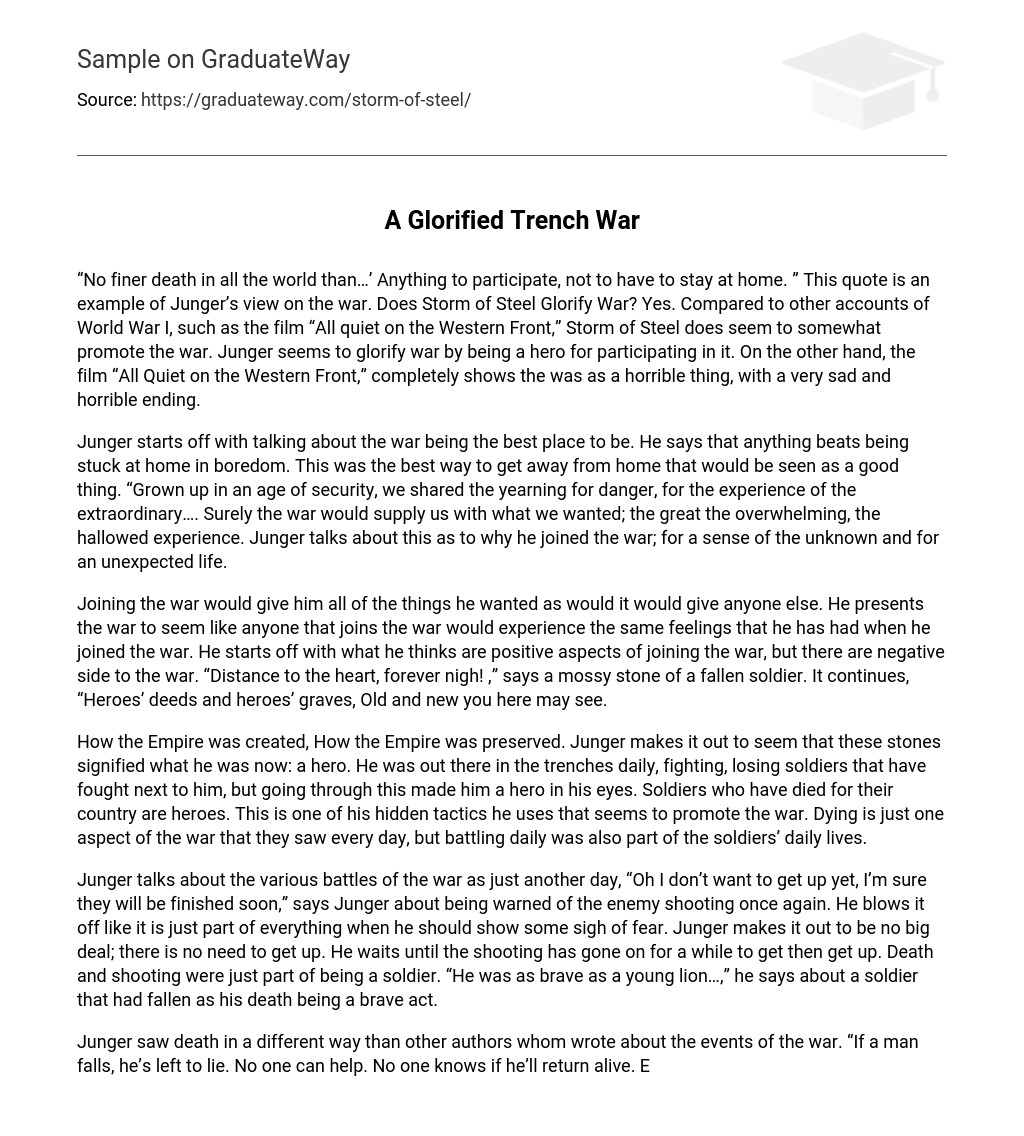Junger’s view on war is exemplified by the quote “No finer death in all the world than…’ Anything to participate, not to have to stay at home.” Storm of Steel does seem to somewhat promote war compared to other accounts of World War I, like the film “All Quiet on the Western Front.” Junger glorifies war by portraying himself as a hero for participating in it. In contrast, “All Quiet on the Western Front” depicts war as a terrible thing with a profoundly sad and tragic ending.
Junger begins by discussing the war as being preferable to the monotony of staying at home. He asserts that anything is better than being confined to a boring existence. Participating in the war offered an opportunity to escape from the mundane and be regarded positively for doing so. “Growing up during times of safety, we all desired excitement, yearned for the extraordinary… The war would surely fulfill our desires for grand, overpowering, and sacred experiences.” Junger cites these reasons as to why he enlisted—to embrace the unfamiliar and to embrace an unforeseen life.
Joining the war would provide him and others with desired outcomes. He equates joining the war with experiencing the same emotions he felt when he joined. Initially, he highlights the positive aspects of joining the war, but acknowledges its negative repercussions as well. A fallen soldier’s moss-covered tombstone laments, “The heart’s pain is always close! Heroes’ accomplishments and heroes’ resting places, Both old and new can be found here.”
Junger portrays the creation and preservation of the Empire as a heroic endeavor. He views himself as a hero, symbolized by the stones, because he fought in the trenches daily, losing comrades in the process. According to Junger, soldiers who sacrifice their lives for their country are heroes. This tactic of promoting war is one of his underlying strategies. Death and daily battles were common experiences for the soldiers during the war.
Junger dismisses the various battles of the war as mundane occurrences, comparing them to just another day. When warned of the enemy shooting once again, Junger nonchalantly remarks, “Oh I don’t want to get up yet, I’m sure they will be finished soon.” Despite the potential danger, he brushes it off as if it is a regular part of his experience, showing no signs of fear or concern. Junger downplays the significance of the situation and chooses to wait until the shooting has persisted for some time before responding. To him, death and shooting were simply routine aspects of being a soldier. Referring to a fallen comrade, he remarks, “He was as brave as a young lion…”, emphasizing the soldier’s courageous sacrifice.
Junger had a unique perspective on death in comparison to other authors who wrote about the war. He observed that when a man fell, there was no one to assist him and his fate remained uncertain. The constant attacks they faced emphasized the life and death nature of their situation. This highlights the fact that death was an integral part of the soldiers’ experience in World War I. On the other hand, All Quiet on the Western Front portrays death as a tragic event, even when it befalls a soldier simply pausing to sketch something meaningful.
The author of Storm of Steel presents death as a triumph rather than a tragedy, glorifying it as something only a “man” can endure. He depicts wounded soldiers who become disconnected from the chaos of battle, but he claims to understand their perspective. The author himself experiences being wounded and describes the intense feelings that accompany it. Despite his injuries, he summons the courage to fight back when his group is unexpectedly attacked. He displays fearlessness and defies the odds by surviving another day, acknowledging the incredible feat it is to continue living in a war. However, the video shown in class depicted a different side of the war, one that did not explore this aspect.
Junger’s accounts of the war depict it as a positive force for society, highlighting the heroic acts he witnesses. Conversely, the videos shown in class portrayed the war as a brutal experience that no one would willingly endure. Consequently, Junger’s novel Storm of Steel romanticizes war by showcasing his own experiences as a soldier. It portrays war as a path from an ordinary existence to one filled with honor and unpredictability.
The perspective on war in Storm of Steel is that it portrays a man as a hero for fighting and sees death as a natural part of war. It suggests that only a true man can endure the challenges of war, which attracts other men. In contrast, other pieces on the war portray it as a negative experience, highlighting how it was detrimental to the soldiers with no positive aspects. However, Storm of Steel seems to glorify the war.
Works Cited:
Junger, Ernst. Storm of Steel. 2004. Penguin Books.
Podcast. Professor Richardson. All Quiet on the Western Front. March 21, 26, 2013.
[1]. Junger, Ernst. Storm of Steel. Penguin Books. 2004. Pg. 5.
[2]. Junger, Ernst. Storm of Steel. Penguin Books. 2004. Pg. 5
[3]. Junger, Ernst. Storm of Steel. Penguin Books. 2004. Pg. 190.
[4]. Junger, Ernst. Storm of Steel. Penguin Books. 2004. Pg. 143.
[5]. Junger Ernst. Storm of Steel. Penguin Books. 2004. Pg. 92.
[6]. Class, Professor Richardson. All Quiet on the Western Front. Podcast. March 21, 26, 2013
[7]. Junger Ernst. Storm of Steel. Penguin Books. 2004. Pg. 92
[8]. Junger Ernst. Storm of Steel. Penguin Books. 2004. Pg. 283.





